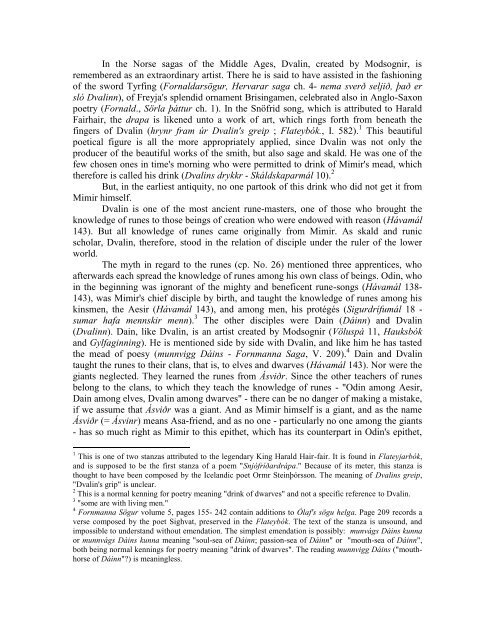Chapters 44-95 - Germanic Mythology
Chapters 44-95 - Germanic Mythology
Chapters 44-95 - Germanic Mythology
You also want an ePaper? Increase the reach of your titles
YUMPU automatically turns print PDFs into web optimized ePapers that Google loves.
In the Norse sagas of the Middle Ages, Dvalin, created by Modsognir, is<br />
remembered as an extraordinary artist. There he is said to have assisted in the fashioning<br />
of the sword Tyrfing (Fornaldarsögur, Hervarar saga ch. 4- nema sverð seljið, það er<br />
sló Dvalinn), of Freyja's splendid ornament Brisingamen, celebrated also in Anglo-Saxon<br />
poetry (Fornald., Sörla þáttur ch. 1). In the Snöfrid song, which is attributed to Harald<br />
Fairhair, the drapa is likened unto a work of art, which rings forth from beneath the<br />
fingers of Dvalin (hrynr fram úr Dvalin's greip ; Flateybók., I. 582). 1 This beautiful<br />
poetical figure is all the more appropriately applied, since Dvalin was not only the<br />
producer of the beautiful works of the smith, but also sage and skald. He was one of the<br />
few chosen ones in time's morning who were permitted to drink of Mimir's mead, which<br />
therefore is called his drink (Dvalins drykkr - Skáldskaparmál 10). 2<br />
But, in the earliest antiquity, no one partook of this drink who did not get it from<br />
Mimir himself.<br />
Dvalin is one of the most ancient rune-masters, one of those who brought the<br />
knowledge of runes to those beings of creation who were endowed with reason (Hávamál<br />
143). But all knowledge of runes came originally from Mimir. As skald and runic<br />
scholar, Dvalin, therefore, stood in the relation of disciple under the ruler of the lower<br />
world.<br />
The myth in regard to the runes (cp. No. 26) mentioned three apprentices, who<br />
afterwards each spread the knowledge of runes among his own class of beings. Odin, who<br />
in the beginning was ignorant of the mighty and beneficent rune-songs (Hávamál 138-<br />
143), was Mimir's chief disciple by birth, and taught the knowledge of runes among his<br />
kinsmen, the Aesir (Hávamál 143), and among men, his protégés (Sigurdrífumál 18 -<br />
sumar hafa mennskir menn). 3 The other disciples were Dain (Dáinn) and Dvalin<br />
(Dvalinn). Dain, like Dvalin, is an artist created by Modsognir (Völuspá 11, Hauksbók<br />
and Gylfaginning). He is mentioned side by side with Dvalin, and like him he has tasted<br />
the mead of poesy (munnvigg Dáins - Fornmanna Saga, V. 209). 4 Dain and Dvalin<br />
taught the runes to their clans, that is, to elves and dwarves (Hávamál 143). Nor were the<br />
giants neglected. They learned the runes from Ásviðr. Since the other teachers of runes<br />
belong to the clans, to which they teach the knowledge of runes - "Odin among Aesir,<br />
Dain among elves, Dvalin among dwarves" - there can be no danger of making a mistake,<br />
if we assume that Ásviðr was a giant. And as Mimir himself is a giant, and as the name<br />
Ásviðr (= Ásvinr) means Asa-friend, and as no one - particularly no one among the giants<br />
- has so much right as Mimir to this epithet, which has its counterpart in Odin's epithet,<br />
1 This is one of two stanzas attributed to the legendary King Harald Hair-fair. It is found in Flateyjarbók,<br />
and is supposed to be the first stanza of a poem "Snjófríðardrápa." Because of its meter, this stanza is<br />
thought to have been composed by the Icelandic poet Ormr Steinþórsson. The meaning of Dvalins greip,<br />
"Dvalin's grip" is unclear.<br />
2 This is a normal kenning for poetry meaning "drink of dwarves" and not a specific reference to Dvalin.<br />
3 "some are with living men."<br />
4 Fornmanna Sögur volume 5, pages 155- 242 contain additions to Ólaf's sögu helga. Page 209 records a<br />
verse composed by the poet Sighvat, preserved in the Flateybók. The text of the stanza is unsound, and<br />
impossible to understand without emendation. The simplest emendation is possibly: munvágs Dáins kunna<br />
or munnvágs Dáins kunna meaning "soul-sea of Dáinn; passion-sea of Dáinn" or "mouth-sea of Dáinn",<br />
both being normal kennings for poetry meaning "drink of dwarves". The reading munnvigg Dáins ("mouthhorse<br />
of Dáinn"?) is meaningless.
















